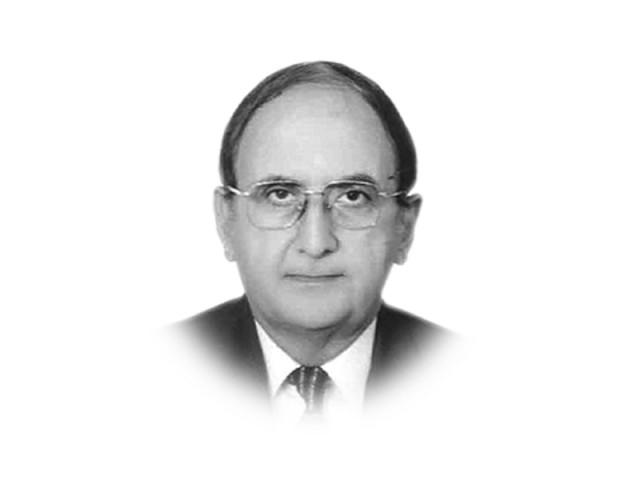The civil-military hybrid
New politico-army arrangements are engendering hope that religious extremism & terrorism will be brought under control

The writer is an independent political and defence analyst. He is also the author of several books, monographs and articles on Pakistan and South Asian affairs
The optimistic interpretation of this development is that the civilian and military leadership is on ‘one page’. Even if this interpretation is accepted, the key question is: who has brought whom on the so-called ‘one page’? Who is gaining and who is losing because of the new governance arrangements? The current determined approach to root out terrorism in a non-discriminatory manner was initiated by the army against the background of the terrorist attack on the Army Public School in Peshawar on December 16, 2014. The civilian leadership was a partner in this decision, announcing the 20-point National Action Plan (NAP) in the first week of January to eliminate extremism and terrorism.
The roots of this decision can be traced back to an earlier decision of the army in mid-June 2014 to start a full-scale security operation in North Waziristan. Later developments showed that the army, the air force and the paramilitary forces pursued this operation against all kinds of Taliban groups and their affiliates in North Waziristan, as well as in some other tribal agencies. The army top brass became more determined to chase violent groups after the attack on the Peshawar school.
The initiation of the security operation in North Waziristan in mid-June 2014 was the army’s unilateral decision. The civilian government led by Prime Minister Nawaz Sharif was not favourably disposed towards any security operation. Its preference for taming the Pakistani Taliban through dialogue was a non-starter but it was not willing to accept its failure. After waiting for four months, the army top brass decided to launch the security operation in North Waziristan. The Nawaz government was left with no choice other than to go along with it.
The apex committees at the federal and provincial levels have created a new institutional arrangement for the army top brass that enables it to prod the federal and provincial governments into adopting a non-ambiguous approach to counter extremism and terrorism in cities. While military courts have been established, these have not started functioning so far. A number of lawyers’ groups have challenged the legality of the military courts in the Supreme Court. Some religious parties are also contesting the domain of these courts. These parties are also resisting the implementation of the 20-point agenda items relating to madrassas, the use of loudspeakers in mosques and restrictions on controversial literature with strong sectarian biases. All this has led the Nawaz government into going slow on the implementation of the NAP, although its top civilian leaders use strong rhetoric in support of countering extremism and terrorism. The matching action is missing.
The Nawaz government can neither afford to alienate the army top brass nor can it completely delink itself from the right-wing sympathisers of militancy and the madrassa establishment. Therefore, it has adopted a midway approach of conceding space to the army for countering terrorism and other related matters in return for letting the current civilian arrangements to carry on. This gives some advantage to both sides. Nawaz Sharif and his allies stay on in power and the army plays the lead role from the sidelines for improving governance and controlling terrorism. The presence of the civilian government in the front assures political and constitutional continuity.
This civil-military hybrid can sustain some civilian semblance and let the army cope with religious extremism and violence. However, the sustenance of this arrangement is not possible in the absence of a satisfactory functioning of civilian political and administrative systems. The civilian leadership must ensure that the law-enforcement and intelligence agencies locate extremist and terrorists groups, religious-sectarian outfits and others engaged in violence, extortion and kidnappings in cities and towns. The religious hardliners and sectarians groups are entrenched in Punjab and these have to be dealt with by civilian authorities. The economy and financial affairs are still being managed by civilians. They also deal with the issues of power shortages and price hikes, as well as daily societal affairs. Another challenge for the civilian system pertains to repeated complaints about financial corruption by top political and bureaucratic officials. Still another challenge for the civilian government is political management, i.e., interaction with other political and religious parties. If the PTI (Imran Khan) resumes street protest or religious parties and madrassa organisations decide to challenge the government, the current civilian system can run into difficulties. This can cause new strains in the ongoing civil-military hybrid.
For the time being, the new politico-army arrangements are ensuring political continuity, stability and are also engendering hope that religious extremism, sectarianism and terrorism will be brought under control. However, the civilian government will still have to perform in the abovementioned domains. A failure in this respect will not only adversely affect the future of the current political arrangements, it will also create a difficult situation for the army leadership that appears determined to stay within the constitutional framework. Simply conceding space to the military does not solve the problem. The civilian leadership will have to muster determination and capacity to do its bit when it comes to controlling extremism, sectarianism and terrorism.
Published in The Express Tribune, February 23rd, 2015.
Like Opinion & Editorial on Facebook, follow @ETOpEd on Twitter to receive all updates on all our daily pieces.














COMMENTS
Comments are moderated and generally will be posted if they are on-topic and not abusive.
For more information, please see our Comments FAQ